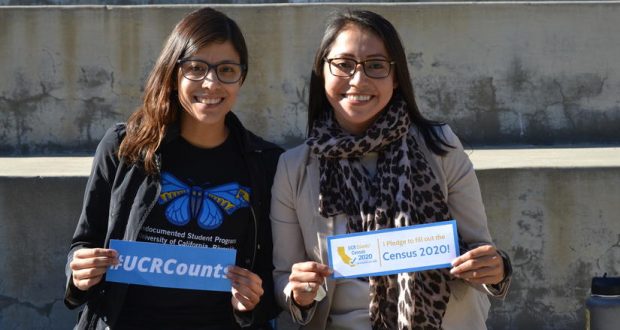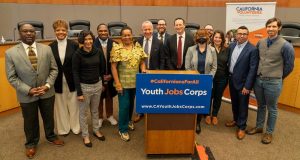RIVERSIDE, CA— Tamara Marquez didn’t know much about the U.S. census before last year, when she applied for a job as a canvasser with the Center for Community Action and Environmental Justice, a nonprofit organization based in Jurupa Valley.
Marquez, a senior at the University of California, Riverside, is forthcoming about why she wanted the job. Originally from Mexico City, she immigrated to the U.S. as a child and remains undocumented, which limits her employment opportunities.
She also admits she didn’t know much about canvassing, going door to door to talk to people about why, exactly, they should care enough about the census to fill it out.
Between November and March, Marquez spent as many as six days per week canvassing in Riverside, later alternating door-to-door sessions with phone banking. At first, she said, talking to strangers was intimidating — especially when they didn’t want to hear what she had to say.
“But you learn pretty quickly to change your script depending on who you’re talking to,” Marquez said. “If you’re talking to a Spanish-speaking household, a family with kids, you might tell them about how the census can affect schools. You’re trying to convince people, so you start by feeling out the environment to figure out which strategies to implement.”
Accurate census representation is critical for UCR students like Marquez because it informs funding for things like Pell Grants, the Federal Work-Study Program, and research activities, said Marlenee Blas.
Blas is the associate director of UCR’s Center for Social Innovation, and since October has served as director of UCR Counts, the university’s official Complete Count Committee.
UCR Counts is situated within a regional network that also incorporates two county governments and about 80 nonprofits, Blas said — all of which have united in an unprecedented effort to ensure the Inland Empire is accurately counted.
The two-county region’s more than 4.6 million people are at dangerous risk of being undercounted, a trend reflected in the 2010 census. That year, nearly one in four Inland Empire households didn’t mail back their census questionnaire; another 40,000 people didn’t receive one at all.
A substantial portion of the region’s residents are part of “hard-to-count” communities, which include undocumented immigrants, non-English speakers and households, and racial and ethnic minorities, among other groups.
Marquez said undocumented communities, in particular, are still likely to view participating in the census as a risk, namely because they fear public data about their communities being weaponized by law-enforcement agencies such as U.S. Immigration and Customs Enforcement, or ICE.
“Taking the census is a risk for undocumented people, but many just have to be informed about the benefits,” she said. “In my experience, the Hispanic households we’ve spoken with are the ones who are most ready to learn and be active. Immigrants already do so much for our communities, and the lack of a citizenship question allows immigrants not only to participate but to continue to help by making sure we all get the resources we need.”
Blas said Inland Empire census activities have had a collateral benefit of bringing together people from different nonprofits and other organizations, allowing many to begin interacting with each other for the first time.
The nonprofit Inland Empire Community Foundation is largely leading the efforts. The foundation was designated an administrative community-based organization, or ACBO, by the state, and thus given funding to drive outreach in hard-to-count communities within the region.
In 2019, the foundation launched Census IE, a coalition of nonprofit and community-based organizations within Riverside and San Bernardino counties, and began to distribute funding to those organizations. It’s divided the Inland Empire into seven subregions, with a regional coordinator assigned to each.
The Center for Community Action and Environmental Justice, which Marquez works with as a canvasser, is the regional coordinator for the Riverside metropolitan area, where more than a quarter of the total population — nearly 696,000 people — lives in hard-to-count tracts.
The patchwork of initiatives has made major gains in the region since ramping up efforts last year. As of March, Census IE canvassers had knocked on more than 130,000 doors in the region. According to Blas, the efforts have paved the way for a new generation of civic leadership in the Inland Empire.
“At the regional level, most of these efforts are being led by young women, many of them Latina,” she said. “They’re truly at the forefront, and because many of them were born and grew up here, the census is a personal project. And because so much is at stake, they’re able to call other people out and hold them accountable. They’re asking questions that matter: ‘Why is money being allocated here and not here?'”
To learn more about census organizing in the Inland Empire — and the young women who are largely leading the charge — click here: https://news.ucr.edu/articles/2020/04/20/movement-census-awareness-swells-inland-empire
 Westside Story Newspaper – Online The News of The Empire – Sharing the Quest for Excellence
Westside Story Newspaper – Online The News of The Empire – Sharing the Quest for Excellence



